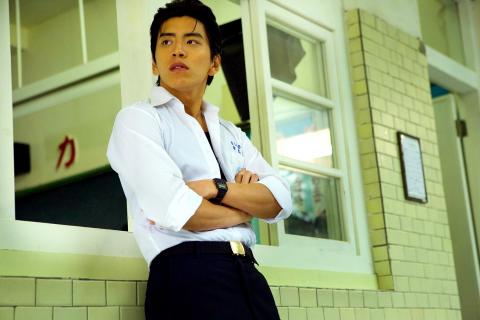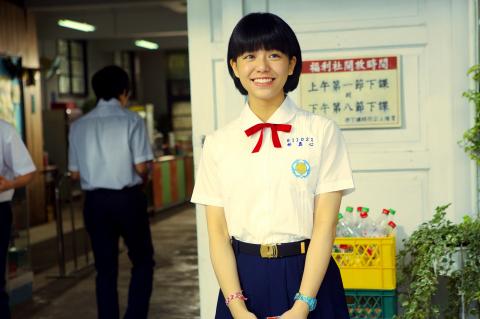Adolescent love and the 1990s come under the microscope in Our Times (我的少女時代), an ambitious movie that could become a summer blockbuster.
Frankie Chen (陳玉珊), in her directorial debut, revises the “ordinary girl meets Prince Charming” tale, injecting a welcome dose of feminine perspective into the overused genre to touch upon the life experience of a girl becoming a woman in 1990s Taiwan. The comedy is supported by an appealing cast of novices, veterans and big-name stars.
It’s present-day Taipei, Truly Lin (Joe Chen, 陳喬恩) is in her thirties and stuck in a dead-end job. One night Lin suddenly recalls her first love, a high school romance that took place in 1994. The younger Lin, played by Vivian Sung (宋芸樺), is a plain, clumsy girl who spends her high-school days goofing around with friends and fawning over the most popular boy in school, Ouyang (Dino Lee, 李玉璽). An unfortunate incident leads Lin to become an errand girl for the school’s much-feared troublemaker Taiyu (Darren Wang, 王大陸).

Photo courtesy of Hualien Media International
It doesn’t take long, however, before Lin sees Taiyu for who he really is: a kind, smart young man. As their friendship evolves, they agree to help each other attract the people they are interested in and in the process Lin and Taiyu soon fall in love.
Meanwhile, Taiyu’s tough behavior results in a clash with school authorities and several street fights. Concerned, his parents send him to the US before he has a chance to say goodbye to Lin.
Fast forward two decades, Lin quits her job and breaks up with her boyfriend. Across town, a sold-out Andy Lau (劉德華) concert is set to take place at the Taipei Arena, where two surprises await our heroine.

Photo courtesy of Hualien Media International
The light-hearted, briskly-paced film is a collaboration between Chen, a seasoned producer of soap operas and top-notch film producer Yeh Ju-fen (葉如芬). The experiences of these two veteran producers show in how well they can pick their cast, which, not to give the film away, include two Asian heartthrobs.
Another pleasant surprise is up-and-coming actress Sung, who captured the public’s attention with her performance the romantic comedy Cafe. Waiting. Love (等一個人咖啡) last year. Sung comes off as a lovable ugly duckling growing to become a strong, attractive girl, while playing well with the comic effect without caricaturing her role.
Chen and her crew have also done a fine job with their attention to detail of the era. Hairstyles, pop songs, sports drinks, tea houses, scary chain letters circulated in school and teenage obsessions with pop stars Lau and Aaron Kwok (郭富城) all create the right 1990s vibe. But the movie isn’t set in the 1990s simply for fun and decoration. It recalls a society that has just emerged from almost 40 years of martial law, an experience that makes the heroine who she is today.
With the screening time exceeding two hours, however, the movie could have used some pruning to keep its structure tighter and story snappier. Plotlines revolving around the two protagonists become repetitive at times, adding no new meaning to the narrative.

Taiwan has next to no political engagement in Myanmar, either with the ruling military junta nor the dozens of armed groups who’ve in the last five years taken over around two-thirds of the nation’s territory in a sprawling, patchwork civil war. But early last month, the leader of one relatively minor Burmese revolutionary faction, General Nerdah Bomya, who is also an alleged war criminal, made a low key visit to Taipei, where he met with a member of President William Lai’s (賴清德) staff, a retired Taiwanese military official and several academics. “I feel like Taiwan is a good example of

March 2 to March 8 Gunfire rang out along the shore of the frontline island of Lieyu (烈嶼) on a foggy afternoon on March 7, 1987. By the time it was over, about 20 unarmed Vietnamese refugees — men, women, elderly and children — were dead. They were hastily buried, followed by decades of silence. Months later, opposition politicians and journalists tried to uncover what had happened, but conflicting accounts only deepened the confusion. One version suggested that government troops had mistakenly killed their own operatives attempting to return home from Vietnam. The military maintained that the

Before the last section of the round-the-island railway was electrified, one old blue train still chugged back and forth between Pingtung County’s Fangliao (枋寮) and Taitung (台東) stations once a day. It was so slow, was so hot (it had no air conditioning) and covered such a short distance, that the low fare still failed to attract many riders. This relic of the past was finally retired when the South Link Line was fully electrified on Dec. 23, 2020. A wave of nostalgia surrounded the termination of the Ordinary Train service, as these train carriages had been in use for decades

Lori Sepich smoked for years and sometimes skipped taking her blood pressure medicine. But she never thought she’d have a heart attack. The possibility “just wasn’t registering with me,” said the 64-year-old from Memphis, Tennessee, who suffered two of them 13 years apart. She’s far from alone. More than 60 million women in the US live with cardiovascular disease, which includes heart disease as well as stroke, heart failure and atrial fibrillation. And despite the myth that heart attacks mostly strike men, women are vulnerable too. Overall in the US, 1 in 5 women dies of cardiovascular disease each year, 37,000 of them